A nursing care plan for pancreatitis is vital as it provides a structured approach to patient care, ensuring all aspects of the patient's condition are addressed. It facilitates coordinated care, improves communication among healthcare providers, and enhances patient outcomes.

Pancreatitis Nursing Care Plan
Explore our Pancreatitis Nursing Care Plan Template with Carepatron guide. Efficient, adaptable, and user-friendly—perfect for healthcare professionals.
Pancreatitis Nursing Care Plan Template
Commonly asked questions
Carepatron enhances pancreatitis care plan management by offering a centralized platform for patient data, easy customization of care plans, and integration of various care aspects. Its telehealth capabilities also allow for remote patient monitoring and consultations.
Yes, Carepatron's platform is versatile and can be used for various medical conditions. Its customizable features and comprehensive data management capabilities suit diverse healthcare needs.
EHR and practice management software
Get started for free
*No credit card required
Free
$0/usd
Unlimited clients
Telehealth
1GB of storage
Client portal text
Automated billing and online payments











